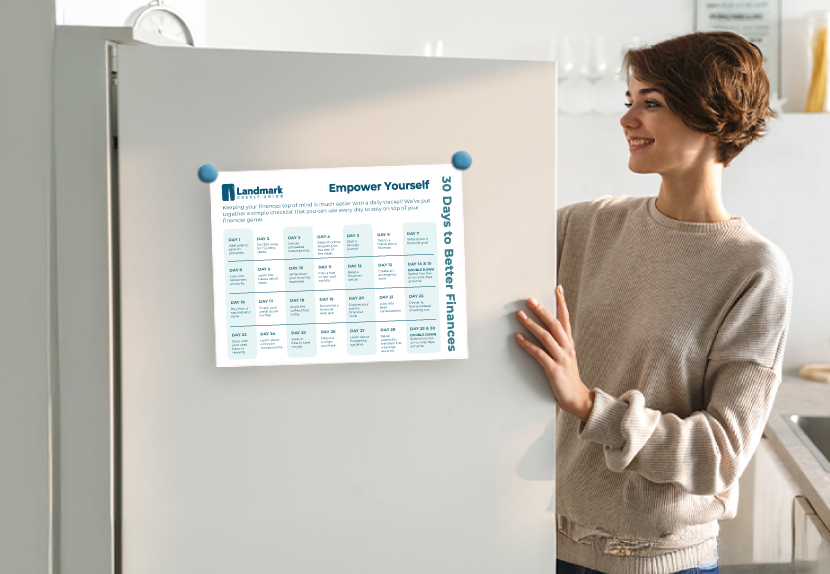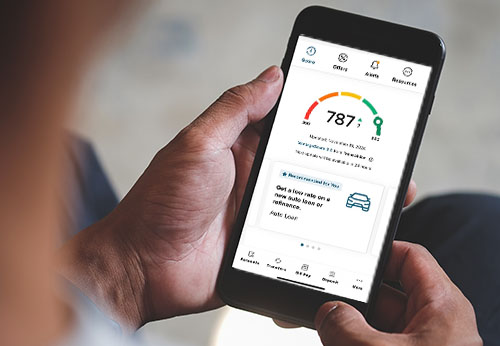
Let’s Break it Down
It’s time to use your financial knowledge to set your goals up for success. Whether it’s additional ways to save, homebuying or managing your credit score we’re ready to lend a hand. Understanding your finances takes time, but becoming your own financial pro can be a great feeling!
Use our resources as stepping stones to continue building confidence in your cash flow.
-
Savings Accounts:
Build your savings with competitive rates and great returns. Check out our certificates and money markets.Learn More -
Maintaining Better Credit:
Explore ways to manage your credit score and ensure that it stays in proper standing.Learn More -
Learning Center:
Expand your financial knowledge with our free online courses. Knowledge is power after all, start learning today.Learn More
-
Budgeting and Debts:
Find a budget that works for you and prevent a future headache with proper debt planning.Learn More -
Keys to Homebuying:
Ready to buy, upgrade or downsize? Discuss your options with one of our experienced loan officers.Learn More
Plan Ahead for College Education Costs
Whether college is years away for your kids, just around the corner, or you’re thinking about going back to school yourself, it’s always a great time to explore ways to make higher education more affordable. College doesn’t always mean overwhelming debt. Taking steps now can help reduce future college debt and set you or your family up for success.
Savings and Preparation
Get into a budgeting and saving mindset. Starting a savings account early on and using those savings to pay for cost in full or reduce loan amounts will put you ahead of the game! Add a college fund into your monthly budget, even a small dollar amount to start can go a long way.
We have plenty of savings tips and budgeting systems on this page to get you started on the right track. Check them out so you can build confidence in your savings.
Scholarship Planning:
Make the most of the free help that’s out there, after all, what’s better than free money for college? Sitting down with your child to search for scholarships can make a difference in reducing future debt.
These opportunities come from all kinds of places like local communities, schools, nonprofit organizations or state programs. The best part is your child doesn’t need to be a straight-A student or a star athlete to qualify. There are scholarships for all sorts of interests. Whether they’re into music, gaming, volunteering or want a future in politics. Start your search early to take full advantage of what’s available!
Payment Tips During School
- Extra Payments on Principal: Make additional payments solely on the principal balance. This can drastically reduce the time it takes to pay off a loan if done consistently.
- Interest Only Payments: Help yourself or your child by paying down interest that is accruing while in forbearance. This will prevent interest from capitalizing, and there will be less to pay back when you enter the payment period.
Flexible Repayment Options:
Help your child review their current student loan repayment plan, it might not be the best fit anymore. Many federal loans offer flexible options, and switching plans can lower monthly payments or extend the timeline to make things more manageable. Contact the loan servicer together to explore better solutions and take control of the repayment process.
Saving for Vacation
Vacation memories shouldn’t come with financial stress. Here’s how to make smart preparations, stay on budget and get the most value from your getaway.
Plan, plan and plan some more! One of the best ways to avoid unnecessary expenses on vacation is to plan ahead. Putting in the effort to research the specifics of your vacation spot can help get the most out of your days without having to worry about last-minute expenses or unforeseen situations. Address the following before booking your next trip.
- Best time to visit
- Local weather
- Travel insurance
- Transportation options
- Local customs
While we encourage you to take a load off once you arrive at your destination, keep a budget in the back of your mind. If you can, try to stick to a daily budget so you don’t overspend or impulse buy. The last thing you want to do is to use up all the money you saved in one day.
What’s better, packing the car for a family road trip or soaring through the sky to your destination? Whatever you choose, make sure you consider the possible costs. Buying a plane ticket may look like a big expense, but a 20-hour drive may end up costing more. When you add up the cost of gas, snacks, tolls and a possible overnight stay, you may end up spending more on the road than on a flight ticket. Try a few of these road trip tips to save you money:
- Calculate mileage to manage the cost of gas
- Prep snacks and meals before leaving
- Swap drivers to skip hotels
- Put money on an E-pass or pay tolls online to avoid toll lines
- Do some car maintenance before leaving
The two biggest costs when it comes to vacations are usually flights and hotel stays. Knowing the best time to book a flight or hotels is just as important as shopping for the best price. There are plenty of sites, apps or articles out there that can help you save money on flights or hotel prices. To get you started, here are a few common tips to help you save in the long run.
Hotel Saving Tips
- Book with a hotel directly instead of a discount site
- Steer clear of peak days like Fridays for check-in or Sundays for check out
- Booking stays on Monday and Tuesday are often cheaper
- Booking the day before, for short trips often has reduced prices
- Use the rewards points you get from a Landmark Rewards Credit Card
Flight Saving Tips
- Departing Monday, Tuesday or Wednesdays are usually cheaper than weekends
- Flights with layovers can be as much as 20% cheaper
- Consider multiple airports when searching
- Use a price tracker

Boost Your Home’s Value
Make your home worth more by making it work for you! Looking for ways to boost your curb appeal? Whether you are renovating your kitchen, replacing your siding or building a new deck, a HELOC is the right choice for all your projects. Check out our recent article on everything you need to know about adding value to your home!
Learn about:
- Project budgeting tips
- Funding strategies
- Aesthetic upgrades that pay off
- High-impact renovation ideas

30 Days to Financial Wellness Calendar
Keeping your finances top of mind is much easier with a daily tracker! Get a free copy of our 30-day savings and wellness calendar. Plus, we’ve recently updated our calendar with tips and tricks directly from our members!
Using Credit Cards Wisely
A credit card is a great tool to have for your financial needs. They can be used to build your credit score, for travel benefits and more. Just be cautious if you are using one for all your expenses.
It’s easy to create a pile of debt with credit card purchases, interest and fees. Learning to use your credit card responsibly is an important skill so you don’t end up with debt you can’t afford to pay back. Lookout for the following pitfalls when using your credit cards.

-
If you use your card for everyday spending, you can use features like auto pay to make sure you never miss a payment. When you pay your balance in full each month you can maximize the benefits and protections that come along with your credit card. Keep in mind, missing payments can negatively affect your credit score.
-
Live within your means and purchase what you can afford. Be smart about your spending habits, and never spend up to your limit. Just because you have access to more money, does not mean you should use all of it. If you have trouble overspending, you can add spending limits using our card management tool in Digital Banking.
-
Experts suggest that you should use less than 30% of your credit. Going over that limit can incur higher fees and quickly prevent you from paying down debts.
-
Set up alerts to monitor fraud. Always keep an eye on your transactions for phony purchases. If you notice charges like these, notify your card company and put a hold on your account. Landmark members can easily monitor transactions like these or put their card on hold by using our mobile app.
-
Understand fees and how interest will be charged to your card. Annual fees and late payment fees can add up without you realizing. Get ahead of this by managing your monthly payments.

Stay on Top of Your Credit Score
Do you know your credit score? If you're looking to upgrade your old vehicle to a stylish new car or give yourself an advantage when applying for a home loan, your credit score can play a key role in that process. If your score is not where you hoped, become a Landmark member and use Credit Hub powered by Savvy Money to set you on the right track. Check your score for free, setup alerts, set credit goals and learn how you can enhance your score1.

5 Tips to Maintain Better Credit
- Pay your bills on time each month: Remember, late payments can affect your score.
- Pay down debt as soon as possible: Avoid using more than 30% of the credit available to you.
- Hang onto old card accounts: The longer a credit line stays open, the more positive it looks.
- Don’t over-apply for new credit: Every application for a card or loan requires a credit check that can ding your score.
- Spread your debts around: Having a mix of credit in your file like a mortgage, car loans or a credit card shows that you can handle multiple debts.
Want an in-depth breakdown of your credit score? Check out our helpful article on all the categories that make up your score.
Grow Your Savings with Confidence
Diversify your savings options for the long haul and complement your goals. Don’t keep your money under the mattress, put it into a savings that grows over time! Take advantage of one or more of our savings options and make your money work for you.

Your Financial Refresher
If you’ve ever been in a funk about your finances, it’s ok! Mastering your finances can be puzzling, and it takes time to establish an ideal financial foundation. That’s where our learning center comes in handy.
We’ve pulled together a comprehensive list of educational articles, courses and guides all in one convenient place tailored for you. These guides can help you learn to pay off lingering debts, control unexpected expenses, plan for the future and more. Launch one of our free courses now!

Why is Budgeting Important?
Learning the ins and outs of crafting a budget is an important skill. Between a mortgage, unexpected emergencies, childcare, medical bills and many other common expenses, costs start to add up.
Creating a budget and sticking to it can help you understand:
- What income you have
- Where your income is going
- Your total expenses
- How you can adjust spending habits to reach savings goals
If learning how to budget is a part of your New Year’s resolution, check out some of our budget friendly articles to help you choose a starting point.
Budgeting for Your Lifestyle
While you may have used a budget plan before, there are plenty of new ones to try out. A budget is never a bad route to take when attempting to pay off debts. Try out one of the popular methods below.
Quick Tips Before Buying a Home
-
Align Your Credit
Stability is the name of the game here. Lenders want to know that your income is steady and that you can make payments on time. Learn ways to improve your credit score in our article How To Improve Your Credit Score. -
Calculate What You Can Afford
Before you get pre-approved, use a mortgage calculator to estimate your monthly payment. Double check that it aligns with your budget and works with your annual income. -
Get Pre-Approved
A pre-approval is a free estimate of how much you will be approved for a home loan. Not only will this provide you with a baseline during your search, but it also gives you an edge when putting in an offer. -
Save For a Down Payment
Determine the percentage that you’re comfortable putting down and save! Keep in mind, putting a higher down payment can help lower your monthly mortgage payment.
Prepping to Sell?
Not only are we here to help with your home buying needs, we’re also ready to help you move into your next home. We can’t pack up the pots and pans, but we can start you in the right direction! If you’re thinking about selling, there are steps you can take to know what you can and cannot afford. Additionally, there are ways you can prepare your home to appeal to potential buyers. Here are some great steps to take if you are preparing to sell your home.
-
Upgrading your home can also mean upgrading your mortgage costs. Even if you’re downsizing, the cost can be more. As an example, you could be going from a $200,000 home to a $300,000 condo. Before making the move, remember to review your finances and make sure you’re comfortable with a new monthly mortgage cost.
-
Chat with a real estate agent before starting a home improvement project. You may think a particular project will add a lot of value, but it may not be what people in the market are looking for. Sometimes simple aesthetic updates are the most worthwhile investments when you're preparing to sell your home. Your real estate agent can help you determine what looks most appealing to a buyer, to get you the best bang for your buck.
-
Declutter your home before you put it on the market. Make it as simple as possible so buyers can imagine themselves in the home. Removing clutter can also make rooms appear larger and more appealing.
-
The best first step in this process is to talk with an experienced loan officer. Set up a meeting so they can walk you through the process and create a comfortable timeline. Establish what you need to do with your home beforehand, and what actions you can take to feel financially stable going forward.
A loan officer will break down where you are financially and make recommendations on what you can afford and what you should avoid purchasing. For example, if you’re planning on buying a new car while you plan to move, they may recommend pushing off the purchase of a new vehicle until you close on your new home loan. Our loan officers can help you get a holistic look at the entire process before taking the next steps.

Time For a Change of Scenery?
Whether you’ve outgrown your space, downsizing your living situation or building a dream home, our experts can help. If it’s time for a change in 2025, we have the resources to get you there. Attend a seminar in person or online to get up to date on the homebuying process.

Utilize Mortgage Calculators
Not sure what you can afford? Determine your budget or discover a better path to paying off your current mortgage with our online calculators.

